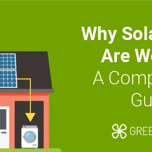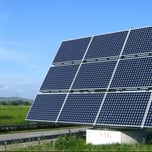Answer these simple questions and we will find you the BEST prices
Which type of solar quotes do you need?
It only takes 30 seconds
100% free with no obligation

Get up to 4 quotes by filling in only 1 quick form

Slash your energy bills by installing solar panels

For the average 2-3 bedroom house
- GreenMatch
- Solar Energy
- Solar Panels
- Integrated Solar Panels
Integrated Solar Panels UK: Costs, Pros & Cons (April 2025)

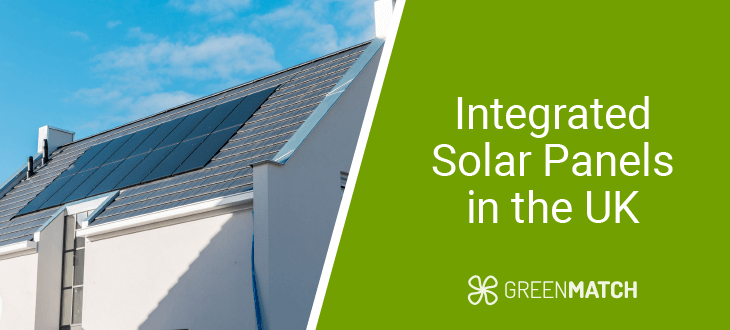
- Integrated solar panels are installed flush within a roof structure, replacing sections of the roofing material, while regular panels are mounted on the rooftop.
- For an average 2-3 bedroom household, a 4kW integrated solar panel system costs between £5,000 - £6,000 and can save you up to £730 a year, allowing you to break even on your investment in about 5 years.
- In-roof solar panels are aesthetically pleasing and blend with the roofline. However, their efficiency is usually 5–10% lower than regular solar panels.
Do traditional solar panels look bulky and unattractive? Then, consider installing integrated solar panels instead. These panels cost and operate much the same as traditional panels. The difference comes in their appearance and how they are installed. That's because integrated solar panels fit in line with your rooftop rather than sitting on top of it.
Whether you're building a new home, replacing your ageing roof, or simply want a solution that complements your existing design, an integrated solar roof could be the answer.
In this article, we'll explore integrated solar panels, covering their costs, savings, pros, and cons to help you decide if they're right for your home. While consulting an experienced solar installer is essential for less traditional options like roof-integrated panels, finding one can be time-consuming, taking several hours of tiresome research.
GreenMatch simplifies the process—fill out a quick 30-second form to receive up to 4 free quotes from vetted installers, compare options, and choose the best fit. Click below to begin!
- Quotes from local engineers
- Payment by finance available
- Save up to £1,110 per year
It only takes 30 seconds



- Difference between integrated solar panels, solar roof tiles and regular solar panels
- Is every home suitable for integrated solar panels?
- How much do roof integrated solar panels in the UK cost?
- Grants for integrated solar panels
- How much can you save by installing in-roof solar panels?
- Performance & efficiency of integrated solar panels
- Pros and cons of in-roof solar panels
- Installation process of integrated solar panels
- Are integrated solar panels worth it?
- FAQ
Difference between integrated solar panels, solar roof tiles and regular solar panels
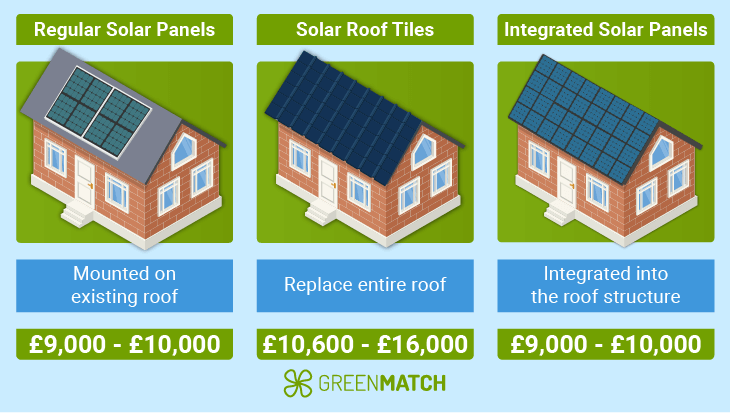
Integrated solar panels, also called in-roof solar panels or built-in solar panels, are designed to be installed as part of your home’s roof. They replace a section of roofing material rather than being mounted on top of the existing roof. This makes them a great option for homes with limited roof space, eliminating the need for additional mounting structures.
Technically, roof-integrated solar panels function just like traditional solar panels or solar roof tiles, using photovoltaic cells to convert sunlight into electricity. However, instead of sitting on top of the roof on visible brackets that can affect your home’s aesthetic appeal, they become a part of the roof structure itself.
Here are some of the key ways in which integrated solar panels differ from regular ones or solar roof tiles:
| Feature | Regular Solar Panels | Solar Roof Tiles | In-Roof Solar Panels |
|---|---|---|---|
| Appearance | Projecting from the roof | Mimic traditional tiles | Embedded into the roof |
| Material | PV cells (thin-film, monocrystalline or polycrystalline) | Monocrystalline solar cells, thin-film PV | Monocrystalline or thin-film solar cells |
| Installation | Mounted on existing roof | Replace entire roof | Integrated into the roof structure |
| Efficiency | 16–22% | 10–20% | 6–17% |
| Scalability | Flexible – panels can be added or removed | Require replacing entire roof sections | May require replacing multiple panels |
| Maintenance | Easier to clean and maintain | Require specialised cleaning | Similar to regular solar panels |
| Lifespan | 25–30 years | 10–20 years | 25-30 years |
| Cost (for 2-3 bedroom house; 4kW system) | £5,000–£6,000 | £10,600–£16,000 | £5,000–£6,000 |
Types of integrated solar panels
It's also important to understand that there are two main integrated solar panel types. Opting for one or the other will determine the manufacturer you'll work with, as well as how much roof-integrated solar panels in the UK cost. The two main types are:
- In-roof frames: These integrated solar panels replace sections of the roof tiles or slates, sitting flush with the underlying roof structure. These frames are commonly used in both home renovations and new builds.
- Bespoke integrated panels: These solar panels are specifically designed and manufactured for in-roof installation. Because of this, they can be a more expensive option than in-roof frames.
Is every home suitable for integrated solar panels?
The slope of your roof determines the suitability of your home for integrated solar panels. Therefore, not every home is suitable for integrated solar panels. The best angle for integrated solar panels in the UK is between 30° and 40°. Solar panels can work efficiently in any direction, however, the most optimal placement is to face them southwards.
The age and condition of your rooftop are also important to consider since you want to avoid your new solar panels outliving particularly aged rooftops.
How much do roof-integrated solar panels cost in the UK?
Integrated solar panels cost around £5,000 - £6,000 for an average 2 - 3 bedroom home. Here's a more detailed breakdown of in-roof solar panel costs for other household sizes:
| House size | Average annual electricity consumption | Solar system size | System price |
|---|---|---|---|
| Small; 1-2 bedrooms | 1,800 | 2kW | £2,500 - £3,500 |
| 3kW | £4,500 - £5,500 | ||
| Medium; 2-3 bedrooms | 2,700 | 4kW | £5,000 - £6,000 |
| 5kW | £7,500 - £8,500 | ||
| Large; 4-5 bedrooms | 4,100 | 6kW | £9,500 - £10,500 |
Estimate potential solar panel costs and savings based on your location using our solar panel calculator.
Hopefully, you now have a clear answer to the question: “How much are solar panels in the UK?” However, it’s important to note that the figures above are estimates and that several factors can influence the total cost of your integrated solar panel system. These include:
- Number of panels: More panels translate to higher upfront costs and greater potential energy generation. The amount of electricity you aim to generate with your solar panels will influence the number of panels required and the overall system cost.
- New build vs. retrofit: Integrating solar panels into a new roof construction can make the installation process easier than retrofitting an existing roof. Retrofitting typically involves additional labour for removing and reinstalling existing roof materials.
- Manufacturer choice: Different manufacturers offer integrated solar panels with varying pricing structures based on materials, efficiency ratings, and brand reputation. Researching different options can help you find a solution that fits your budget and performance needs.
Solar panel loans & financing options
With solar panel finance, you can pay for your panels in instalments over an agreed period, from several months up to 20 years.
Some financing options include:
- Monthly subscriptions through installation companies, personal loans, and government grants.
- Interest considerations: Financing can involve interest rates, typically a 9.9%–14.9% annual percentage rate (APR), though some providers offer 0% rates.
While financing can make solar panels affordable initially, you may ultimately pay more than with an upfront purchase because of interest rates.
Grants for integrated solar panels
Installing solar panels isn’t cheap. Thankfully, multiple solar panel grants and financial incentives are currently available in the UK. While these aren’t specifically targeted towards integrated solar panel installation, you may still be able to apply and benefit from some of the funding options available today. These include:
| Grant | Who can apply? | Potential savings |
|---|---|---|
| Energy Company Obligation (ECO4) | Low-income households across the UK | Partially funded or free solar panel installation |
| Home Upgrade Grant (HUG) | Homeowners living in England with homes that have low energy performance ratings of D to G | Up to £10,000, depending on the region in which you live and your property type |
| Public Sector Decarbonisation Scheme (PSDS) | Companies and public sector institutions looking to lower their carbon emissions | The amount is regionally dependent |
| Home Energy Scotland Grant and Loan | Low-income households in Scotland or homes with low energy performance ratings (D to G) | Up to £6,000 (£1,250 grant + £4,750 optional loan) |
| Warm Homes Nest Scheme | Homeowners based in Wales | Fully funded solar panel installation |
| 0% VAT | All solar panel buyers across the UK | Up to £2,850 for an average household with a 4kW solar system |
| Smart Export Guarantee (SEG) | All solar panel owners across the UK | Up to £470per year, depending on household size and SEG tariff |
| Warm Home Plan | Social housing residents, lower-income householders and renters | Funding towards new solar installation |
If the thought "Is my house suitable for solar panels?" (let alone in-roof solar panels) is still swirling in your head, you should consult a solar expert. This way, you'll get an idea of the best solar panels and their prices, allowing you to make an informed decision.
Instead of wasting hours of your precious free time looking for a professional on your own, simply fill out our 30-second form below. We will provide you with up to 4 solar panel quotes from the best installers near you. Our service is completely free and non-binding. Click the button below to begin.
- Quotes from local engineers
- Payment by finance available
- Save up to £1,110 per year
It only takes 30 seconds



How much can you save by installing in-roof solar panels?
Roof-integrated solar panels in the UK are quite the initial investment, yet they can lead to substantial savings in the long run. Based on your property size and the solar panel size, in-roof solar panels in the UK can save you between £485 and £1,110 a year.
For example, the average household in the UK has 2-3 bedrooms and can be well-served by a 4kW solar system or even a 5kW solar system, which can translate to savings of £730 per year.
| Property size | 1–2 bedroom house | 3-bedroom house | 4-bedroom house |
|---|---|---|---|
| Annual electricity usage (kWh) | 1,800 | 2,700 | 4,100 |
| Number of solar panels (350W) | 5-8 | 10-13 | 16 |
| Solar system cost | £2,500 - £3,500 | £5,000 - £6,000 | £9,500 - £10,500 |
| Annual savings | £485 | £730 | £1,110 |
| Break-even point (years) | 6 - 7 | 5 - 11 | 8 |
| Savings in 25 years | £12,125 | £18,250 | £27,750 |
Additionally, you can save even more through incentives such as the Smart Export Guarantee (SEG), which allows you to sell surplus solar energy back to the grid. This can increase your annual savings by up to £1,220, depending on the size of your solar system and the SEG rates offered by energy suppliers.
At the same time, because of the 0% VAT incentive, you can save around £2,850 for an average-sized home when installing a 4kW system and battery. This eliminates the 20% VAT homeowners would normally be charged on both the equipment and labour. Your installer will apply this discount automatically.
Performance & efficiency of integrated solar panels
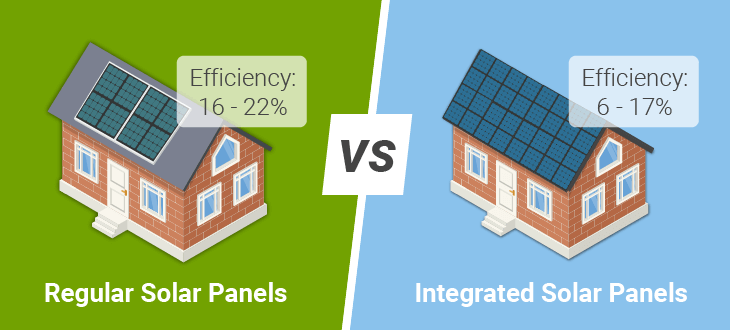
While integrated solar panels share multiple similarities with traditional solar panels, one key difference is their lower efficiency rate. Normal, roof-mounted solar panels are typically 16-22% efficient, whereas integrated solar panels have efficiency rates of 6-17%.
Since integrated panels sit in-line with the roof, there is less natural ventilation to keep them cool. This affects the efficiency since they are more prone to overheating.
What's more, higher-efficiency panels produce more electricity from the same amount of sunlight compared to lower-efficiency panels. This increased energy production translates to greater potential savings on electricity bills.
Therefore, the average home can expect to save less than £730 per year and break even on its investment in 5+ years.
At the same time, once installed, there are a few things you can do to ensure that your integrated solar panels maintain their efficiency over their 25-year lifespan. This way, you can best enjoy all their financial and environmental benefits. Here are some ways to maintain solar panel efficiency:
- Choose the right solar panels: The importance of selecting the best solar panels for your specific situation cannot be overstated. Be sure to choose the right solar system size and invest in high-quality integrated solar panels. This way, you have the assurance that your solar panels will last and perform well for years to come.
- Consider optimal solar panel placement: To maximise solar panel efficiency, you will need to consider angle and orientation. The best position for a solar panel installation is on a south-facing section of your roof at a 30°-40° angle, though panels can still perform well on roofs facing other directions. Make sure to have a professional assess your roof to ensure that your integrated solar panels can be installed adequately for optimal performance.
- Carry out regular checks: Having an installer check your solar panels periodically allows you to carefully monitor your solar panels’ efficiency levels. Additionally, this can be a great way of catching any potential damage early before it can escalate into bigger and more expensive issues that will negatively affect your system’s power output.
- Clean your solar panels periodically: One of the surest ways to maintain their efficiency is to keep the surface of your integrated solar panels free of dirt or debris. Since they work by absorbing sunlight, you’ll need to make sure that they aren’t obstructed by dirt that can impact their ability to generate electricity.
Pros and cons of in-roof solar panels
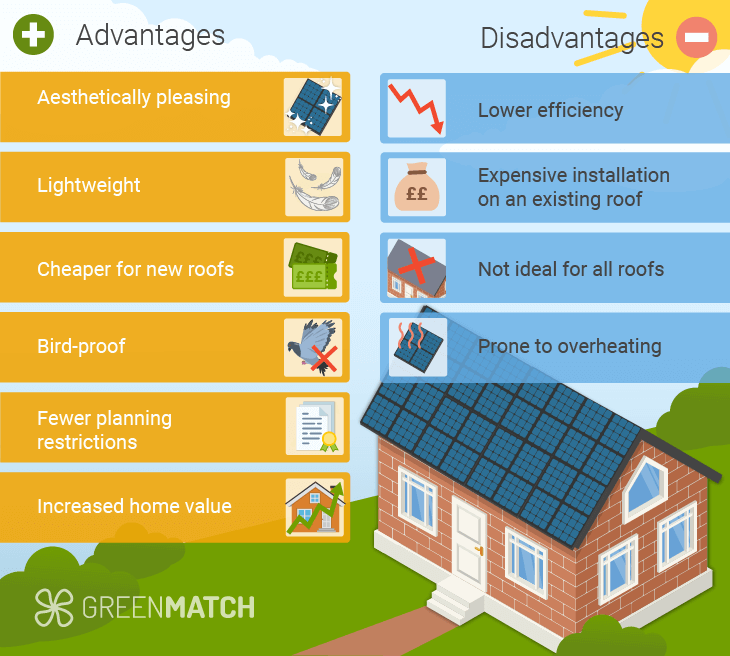
Integrated solar panels have advantages and disadvantages compared to regular solar panels. Let's take a look at them in more detail.
Advantages of built-in solar panels
- Aesthetically pleasing: Integrated solar panels become an integral part of the roof itself, creating a sleek, modern look. Additionally, you can customise your installation in terms of size, shape, and material options, as some manufacturers offer a variety of aesthetically-appealing solutions. It's a perfect choice for homeowners who value seamless design.
- Lightweight: Compared to traditional panels, which typically weigh 18–24kg per panel, integrated solar panels are lighter, weighing an average of 10–20kg per piece. This translates to less stress on your roof structure, which is especially beneficial for older roofs or regions prone to harsh weather conditions. Despite being lighter, in-roof solar panels are still wind-resistant and can withstand snow on their surface.
- Cheaper for new roofs: Covering the roof of a new 2-3 bedroom house with tiles on average costs £15,400, while installing in-roof solar panels for the same house costs between £9,000 and £12,000.
- Bird-proof: Birds can be a nuisance for traditional solar panels, nesting underneath or causing damage. Since integrated solar panels are a part of the roof's structure, they offer a smooth, bird-deterring surface.
- Fewer planning restrictions: Conservation areas often have strict regulations regarding the visual impact of modifications on buildings. Solar panels integrated into roofs, with their seamless design, are often viewed more favourably by planning authorities than traditional solar panel installations. Be sure to check local building regulations to ensure that your installation meets all their requirements.
- Increased home value: Installing solar panels may elevate your home's worth by 4.1%, translating into £9,500 on average UK home values.
Disadvantages of built-in solar panels
- Lower efficiency: Integrated solar panels may convert slightly less sunlight into electricity than traditional panels (around a 5-10% decrease). This happens mainly because there is less air ventilation in this type of installation and due to the limited positioning flexibility. Even so, you can still get noticeable savings with integrated solar panels, resulting in a break-even point between 6 and 8.
- Expensive installation on an existing roof: Installing integrated solar panels is typically more complex and expensive when retrofitting an existing property. The exact price depends heavily on your housing situation and solar project. Therefore, consulting a local solar expert is crucial for tailored estimates.
- Overheating: Because they sit flush with the roof, the airflow around the panels is limited, which reduces the efficiency of solar panels. Without enough air ventilation, integrated panels reach higher operating temperatures, which reduces their efficiency in converting sunlight into electricity. However, if you’re worried about them being a fire hazard, it’s good to know that they rarely pose a risk, as the main consequence of overheating is reduced power output.
Still not sure whether your property will benefit from built-in roof solar panels? Ask a professional installer!
Answer a few short questions and we will connect you with up to 4 solar panel experts near you. Our offer is free and non-binding, allowing you to compare the quotes without committing to any offers. Just click below to begin; it takes less than 1 minute.
- Quotes from local engineers
- Payment by finance available
- Save up to £1,110 per year
It only takes 30 seconds



Installation process of integrated solar panels
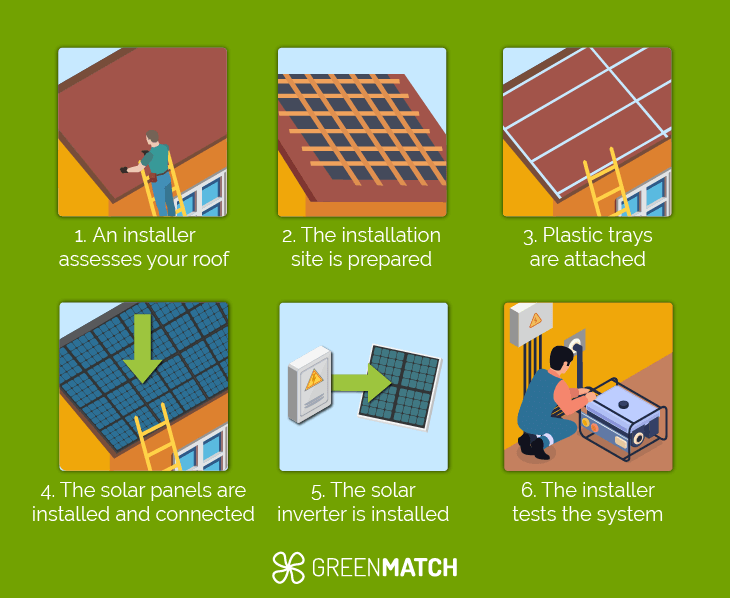
If you decide to have integrated solar panels installed, then these are the following steps you can expect in the process:
- An installer assesses your roof: The professional who will fit your system begins by assessing the installation site to determine whether your roof is suitable for integrated solar panel installation. The type and condition of your roof, as well as the best angle and orientation for your installation, are considered.
- The installation site is prepared: If you’re working with an existing roof structure, then the tiles are removed to make room for the solar panels. If the installation is taking place before the roof is completed, then the solar panels can easily be installed without extensive prior preparation.
- Plastic trays are attached: The installer attaches plastic trays to the underlying roof structure. These act as a barrier between the roof structure and the solar panels while also offering a weatherproofing solution. They essentially serve as a replacement for your roof tiles.
- The solar panels are installed and connected: The solar panels are installed on top of the plastic trays using a racking system, and the necessary wiring is carried out to connect the panels to each other.
- The solar inverter is installed: The inverter (which converts DC energy to AC energy for your home) is connected to the solar panels and to your home’s electrical system.
- The installer tests the system: Once everything is in place, the installer carries out final checks to ensure that your system is working correctly. After they confirm that your integrated solar panels function properly, you can start enjoying your system!
While this process is quite complex, it can take between 1 and 3 days to install the integrated solar panels for a new build. However, if you’re working with an existing roof, it can take up to 2 weeks to finalise the installation, as the tiles will first need to be removed.
Because the installation can be more complex, it can also be more costly than that of regular solar panels, which can easily be mounted on a roof in around 1-3 days. So, be sure to consult a professional to determine how long your integrated solar panel installation might take to avoid any surprises when it comes to your total expenses.
Are integrated solar panels worth it?
So, are solar panels worth it? Yes, they can be! Integrated solar panels can help you save between £485 and £1,110 per year on your electricity bills and allow you to reduce your household’s carbon emissions.
Based on this, the average home can expect to save up to £730 in 25 years and break even in 5 years.
Additionally, the panels themselves won’t cost you more than regular solar panels, but they don’t require bulky metal structures. Instead, they blend seamlessly into your roof, giving it a sleek and modern look.
However, it’s also important to consider that integrated solar panels come with lower efficiency ratings (6-17%) and can be more expensive to install than traditional solar panels, especially on existing roofs. So, if you're looking for cheap solar panels, traditional options remain the better choice unless aesthetics are a top priority.
All in all, if you're looking for a solar panel system tailored to your home, consider getting quotes from several installers to evaluate your choices. This ensures you get competitive prices and work with reliable engineers nearby without having to worry about getting ripped off.
Finding trustworthy installers can be a challenge, taking hours and even days of tedious research. Thankfully, we can do the heavy lifting for you. Complete our 30-second form and we'll connect you with top-rated solar installers in your area. Click the button below to get up to 4 free, no-obligation quotes.
- Quotes from local engineers
- Payment by finance available
- Save up to £1,110 per year
It only takes 30 seconds



FAQ
Yes, installing integrated solar panels can increase the value of your home by as much as 4.1% making them a valuable investment.
Not necessarily for certain types of development. As long as your property isn’t classified as a listed building, a leasehold property, or is located in the conservation area, you don’t generally need planning permission from the authorities.
No, building-integrated photovoltaics (BIPV) are not the same as solar panels. Solar panels are standalone devices that can be installed on rooftops or other surfaces to generate electricity from sunlight. BIPVs, on the other hand, are photovoltaic systems that are integrated into the building structure itself, such as roof tiles or building facades
No, in-roof solar panels are generally 6-17% less efficient than traditional on-roof solar panels. However, they can still help you save up between £485 and £1,110 yearly based on your property size.


We strive to connect our customers with the right product and supplier. Would you like to be part of GreenMatch?

- Difference between integrated solar panels, solar roof tiles and regular solar panels
- Is every home suitable for integrated solar panels?
- How much do roof integrated solar panels in the UK cost?
- Grants for integrated solar panels
- How much can you save by installing in-roof solar panels?
- Performance & efficiency of integrated solar panels
- Pros and cons of in-roof solar panels
- Installation process of integrated solar panels
- Are integrated solar panels worth it?
- FAQ
- Quotes from local engineers
- Payment by finance available
- Save up to £1,110 per year
It only takes 30 seconds




